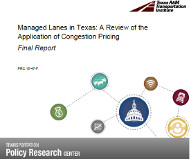Article from: www.thenewspaper.com/news/50/5066.asp
10/19/2016
Report Reviews Texas Tolling Experience
Texas Transportation Institute evaluates the response to imposing tolls on freeways in the state.
 Transportation officials around the country have embraced the concept of turning congestion into a source of revenue. Texas in particular was an early leader in congestion taxes, with tolls collected on ten major highways and five more projects in the works. A new Texas A and M Transportation Institute report reviews the state's experience over the past twenty years, describing the purpose of tolling as a method of manipulating behavior.
Transportation officials around the country have embraced the concept of turning congestion into a source of revenue. Texas in particular was an early leader in congestion taxes, with tolls collected on ten major highways and five more projects in the works. A new Texas A and M Transportation Institute report reviews the state's experience over the past twenty years, describing the purpose of tolling as a method of manipulating behavior.
"Drivers (and the public at large) have limited to no awareness of the true costs of congestion, so direct pricing based on congestion levels helps send signals to drivers about the cost of their trip, enabling them to make more informed decisions regarding their transportation options," the report explains. "However, in practice the application of congestion pricing can be problematic."
The report notes three main sources of public resistance to congestion taxes. The first is that motorists are already paying for infrastructure with their tax dollars, so tolls amount to a double tax. Second, congestion tolls require highly complicated implementation schemes.
"Pricing in the general sense is complex to communicate to the public and stakeholders but becomes even more complex in actual application within a highway environment," the researchers explained. "Users of priced facilities must abide by specific requirements for toll accounts, understand how toll rates are set, understand how eligibility to use the lanes is determined, be aware of the times of day of operation, and know where they can enter and exit the facility."
Most importantly, the public often views tolls as favoring the wealthy at the expense of drivers who cannot afford to pay to use the "Lexus lanes." Most toll facilities deal with this concern by offering small subsidies for low-income residents. They also divert a portion of the tolling profit to subsidize transit systems.
By 2018, the Dallas-Fort Worth area will have the nation's largest network of congestion priced roads run by foreign companies such as Cintra and Ferrovial of Spain and Australia's Macquarie. The Lone Star State's tolling push was bankrolled in 1994 by the Federal Highway Administration's "value pricing" pilot program, which resulted in the $2.8 billion reconstruction of the Interstate 10 Katy Freeway in 2008. By 2011, about 1.5 million unique transponders used the pay-to-drive lanes.
The report draws no explicit conclusion about the wisdom of congestion taxes, but it suggests that most of the objections can be addressed with policy changes. A copy of the report is available in a 1.3mb PDF file at the source link below.
Source: Managed Lanes in Texas - A Review (Texas Transportation Institute, 9/20/2016)
Permanent Link for this item
Return to Front Page
 Transportation officials around the country have embraced the concept of turning congestion into a source of revenue. Texas in particular was an early leader in congestion taxes, with tolls collected on ten major highways and five more projects in the works. A new Texas A and M Transportation Institute report reviews the state's experience over the past twenty years, describing the purpose of tolling as a method of manipulating behavior.
Transportation officials around the country have embraced the concept of turning congestion into a source of revenue. Texas in particular was an early leader in congestion taxes, with tolls collected on ten major highways and five more projects in the works. A new Texas A and M Transportation Institute report reviews the state's experience over the past twenty years, describing the purpose of tolling as a method of manipulating behavior.